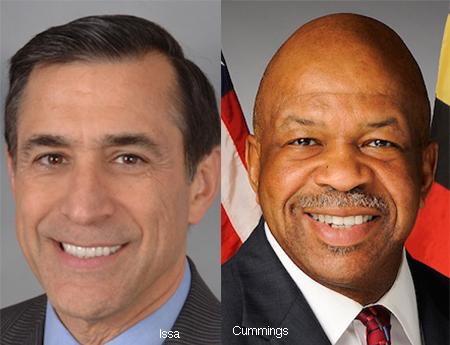FOIA Reform Bill Introduced in House

The smarter way to stay on top of broadcasting and cable industry. Sign up below
You are now subscribed
Your newsletter sign-up was successful
House Oversight Committee chairman Darrell Issa (R-Calif.) and ranking member Elijah Cummings (D-Md.) have introduced bipartisan legislation to reform the Freedom of Information Act.
The FOIA Oversight and Implementation Act of 2015 would, among other things, require agencies to process FOIA requests with a "presumption" of openness, putting the burden on the agency to demonstrate an identifiable harm in releasing it.
It would also require information released to be posted online if it is in the public interest, strengthen the FOIA ombudsman office, strengthen oversight of FOIA compliance, and strengthen dispute resolution.
“At a time when the American people’s trust in the federal government is at an all-time low, we must strengthen and refine our laws that enable transparency and openness in government,” said Issa in a statement. “Requests through the Freedom of Information Act remain the best tool for the American people to hold their government accountable. In this information technology driven era, it should be easier, not harder for citizens to have simpler and broader access to government information.”
“This bipartisan legislation will strengthen one of our most critical open government laws by bringing greater sunlight to federal agency actions,” added Cummings. “There should be a presumption of openness in this country, and agencies should have to justify their actions when they want to withhold information from the American people.”
The Senate Judiciary Committee is meeting Feb. 5 in part to discuss its own version of FOIA reform, the FOIA Improvement Act of 2015, a 2014 version of which passed in the Senate last session, but not in the House. That bill also has a presumption of openness.
Senate Judiciary Chairman Charles Grassley (R-Iowa) is an original co-sponsor of that bill, which is nearly identical to the one that passed last time around.
The smarter way to stay on top of broadcasting and cable industry. Sign up below
“The government ought to be accountable to the people, and transparency yields accountability," Grassley said in a statement. "Unfortunately, federal agencies continue to find creative ways to avoid the level of transparency that FOIA was designed to foster. This bill takes an important step stop agencies from hiding behind an exemption solely to protect their public image. Instead, it requires agencies to disclose information unless they reasonably foresee that disclosure would harm an interest that an exemption protects."
Contributing editor John Eggerton has been an editor and/or writer on media regulation, legislation and policy for over four decades, including covering the FCC, FTC, Congress, the major media trade associations, and the federal courts. In addition to Multichannel News and Broadcasting + Cable, his work has appeared in Radio World, TV Technology, TV Fax, This Week in Consumer Electronics, Variety and the Encyclopedia Britannica.

